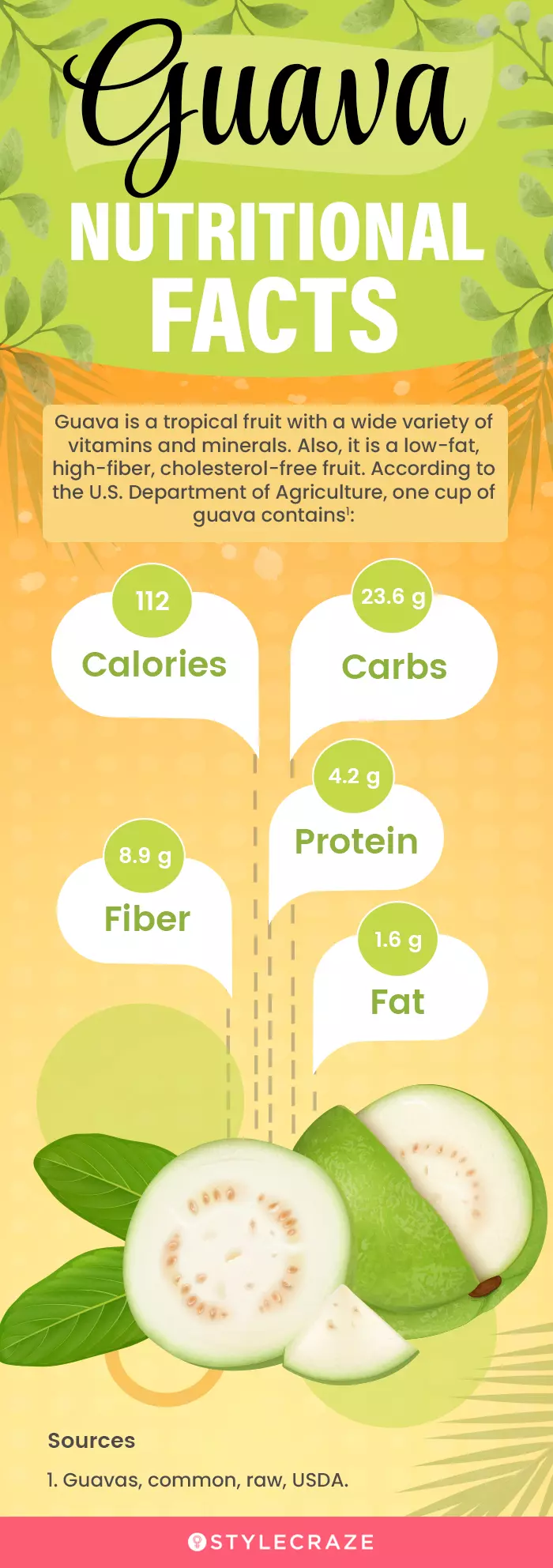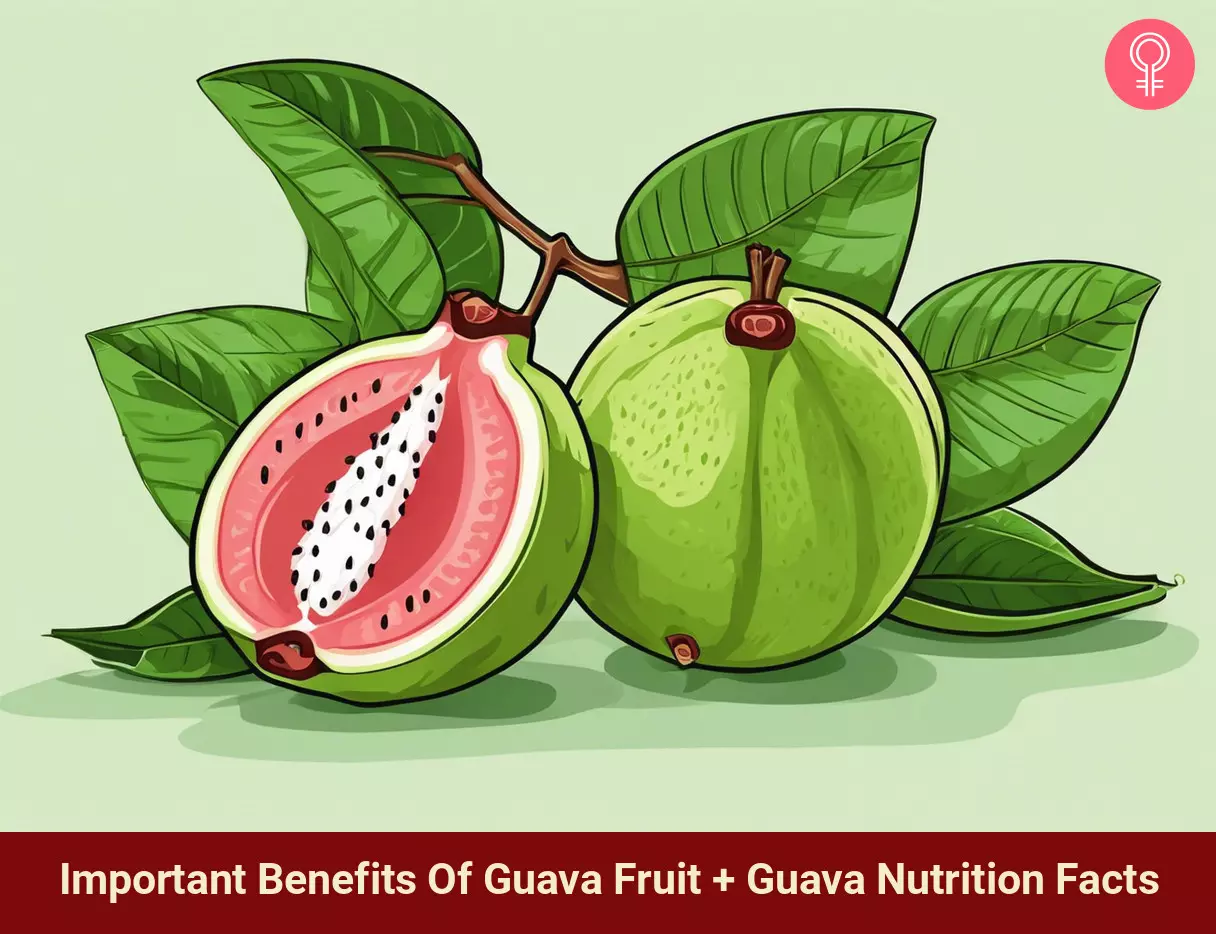Scroll down to learn more about this tropical fruit, the health benefits it offers, nutrition, and possible side effects.
What Are The Benefits Of Guava?
Guava’s benefits stem from its rich dietary fiber and vitamin C content. Dietary fiber boosts digestion while vitamin C reduces free radicals in the body. Learn more about the health benefits of amrood here. What Are Its Benefits? It helps lower blood pressure, improve skin complexion, and reduce menstrual cramps. Who Can Consume It? Anyone can eat this nutritious fruit except people with irritable bowel syndrome or diabetes. How Often? You can eat 1 to 3 guavas daily. Caution Excess consumption may cause gas, bloating, cramps, and loose stools.
1. May Help You Manage Diabetes
The fiber in the fruit can lower blood sugar levels (1). It can also prevent constipation, a common problem faced by individuals with diabetes. An Indian study states that guava (without the peel) can help in lowering blood sugar and blood cholesterol levels. This cuts the risk of diabetes (2). Animal studies show that guava leaf extracts may have antihyperglycemici The property that helps keep glucose levels near the lower range to reduce the risk of diabetes and other heart diseases. effects against type 2 diabetes (3), (4).
2. May Protect Your Heart
The fiber in guava lowers bad cholesterol, which may otherwise contribute to heart disease. The potassium in the fruit can help lower blood pressure levels (5). The polysaccharidesi The most abundant carbohydrates made of many simple sugars that serve as essential sources of energy in plant and animal cells. (a type of carbohydrate) in guava leaves act as antioxidants and fight oxidative stress (6). This is important because oxidative stress is one major cause of heart failure (7). There are several benefits of guava leaves, one of them being that it can be used as tea, and may also help prevent atherosclerosis (8).
3. May Boost Digestive Health
One guava can give you about 12% (3 grams) of the recommended dietary fiber (9). Some sources suggest that the leaves of the fruit may treat nausea and vomiting. However, more research is needed to establish these effects. Medical literature also states that guava can treat diarrhea due to its antimicrobial and antispasmodici The nature or property that inhibits the contraction of smooth muscles and helps relieve pain and discomfort. properties. This is especially true with the extracts of the fruit and the leaves (10). Guava’s antimicrobial properties can also fight the harmful gut microbes (like simian rotavirus) and potentially prevent digestive infections (11). Also, according to one more research, the flavonoids present in guava leaf extract chiefly determine their antibacterial and antifungal activity. In contrast, quercetin, which is the most predominant phytochemical of guava leaves, exhibits antidiarrheal solid activities. The presence of phenolic compounds, such as gallic acid, pyrocatechol, taxifolin, ellagic acid, ferulic acid, and several others, is responsible for the antioxidant roles of guava leaves (12).
4. May Boost Immunity
Guava is replete with vitamin C (9). Studies state that vitamin C can help boost immunity and fight the disease-causing pathogens (13). Vitamin C also protects your body’s cells from damage. It may reduce the risk of serious diseases, like arthritis, cancer, and some forms of heart disease (14), (15). Ensure you have the fruit ripe as it contains the most vitamin C (16).
5. May Relieve Menstrual Symptoms
In a study, 197 women with dysmenorrhea (painful menstruation) found relief after taking 6 mg of a drug containing guava extracts per day (17). Another rat study revealed the spasmolytic effects of guava leaf extract. The extract could relieve cramps of the uterine smooth muscles (18).
6. May Promote Weight Loss
There is a lack of direct research in this aspect. The fiber content of the fruit may help boost one’s weight loss efforts. The fruit is also low in calories. A medium guava contains about 38 calories and can be included in a weight loss diet (9).
7. May Reduce Cancer Risk
Apart from vitamin C, guava also contains lycopene. Both these antioxidants help reduce cancer risk. They may also prevent the proliferation of cancer cells (14), (19). Guavas are especially powerful in aiding the treatment of cancers of the breast and prostate (20). Guavas contain fiber. This nutrient helps reduce the risk of hemorrhoidsi A medical condition where the veins in the rectum and anus enlarge and cause discomfort during bowel movements or while sitting. and colon cancer (21), (22). Other studies state that guava leaf extracts also could help reduce cancer risk (23).
8. May Protect The Skin From Wrinkles And Premature Aging
Want to know about Guava benefits for skin? Guava contains antioxidants. These compounds can protect skin from UV damage and potentially delay the signs of aging (24). The vitamins A and C in guava play a role in enhancing skin firmness (25), which has an excellent anti-aging effect. Guava leaf extracts possess anti-inflammatory properties that help in the treatment of acne (26).
9. May Improve Skin Complexion
Other important benefits of eating guava include keeping skin fresh and boosting complexion. Although, there is less research in this regard. However, if you are easily prone to allergies, check with your doctor before using guava on your face.
10. May Improve Your Vision
The vitamin A in guava may boost vision. This nutrient is known to cut down the risk of cataracts and macular degeneration. The abundant vitamin C in the fruit also contributes to better vision (27).
11. Beneficial During Pregnancy
Guava is a good source of folate (9). The nutrient cuts the risk of birth defects and is essential during pregnancy (28).
12. May Ease Your Stress
Guava contains magnesium (9). This nutrient is known to relax the body’s nerves and muscles and may ease stress (29). Some studies suggest that magnesium may help relieve anxiety in individuals, although more evidence is needed in this regard. (30).
13. May Stimulate Cognitive Function
Guava contains vitamins B6 and B3 that are known to promote cognitive health. Vitamin B6 has shown to reduce the risk of dementiai A group of related symptoms affecting the ability to think, remember, speak, and behave, which interfere with one’s daily functioning. , cognitive decline, and depression (31). In animal studies, vitamin B3 had shown improvements in neurodegeneration (32). Jesse Feder, RDN, says, “Guava is high in sugar and can affect your blood sugar. It contains a good amount of B6 and B3, which contribute to healthy brain cell function and blood flow. Guava can increase blood sugar levels due to its high sugar content and should be eaten in moderation.”
14. May Help Prevent Cough
Guava leaf extracts possess anti-cough properties. In studies done on rats and pigs, water extracts of the leaves had decreased the frequency of cough(33).
15. May Relieve Tooth pain
Guava leaves possess antimicrobial, anti-inflammatory, and analgesic properties that may help relieve toothache. The leaves may also be of use in the treatment of periodontal diseasei A dental disease characterized by gum inflammation and infection caused due to poor oral hygiene. (34).
Guava Nutrition Facts
Values sourced from USDA, guavas, common, raw One guava contains 126 mg of vitamin C, which meets a whopping 209% percent of your daily recommended values. The fruit also contains 229 mg of potassium, 343 IU of vitamin A, and 27 mcg of folate. These are among the most important nutrients in the fruit. If you are wondering how to include guava in your meals, then the next section is for you. Keep reading to learn some guava preparation tips.
Guava Preparation Methods
Guavas are delicious when eaten fresh. Simply wash the fruit, slice it in half, and enjoy the sweet and tangy flavor. You can also enjoy them in other ways, such as:
Blending them with other fruits, vegetables, and liquids for a refreshing smoothie. Adding them to fruit or green salads. Drinking guava juice on its own or mixed with other juices. Consuming guava jam and jelly as delicious spreads that can be enjoyed on toast, pancakes, or biscuits.
After learning about guava’s nutrition facts, we will proceed to the next section. Guava is beneficial for your health. However, does this mean you can eat as many guavas as you want? Or would it cause any adverse effects?
What Are The Side Effects Of Eating Guava?
Limited research is available in this aspect. Excess consumption of this fruit may cause certain side effects, though information is insufficient. Hence, practice caution. You can stick to 1 to 3 guavas a day. If you have any specific medical condition or are pregnant/breastfeeding, consult your doctor before including guava in your diet. According to Jesse Feder, RDN, “You should avoid eating guava if you experience gastrointestinal issues, such as bloating, constipation, cramping, loose stools, or if you have an allergic reaction. Additionally, it is best to limit guava intake if you have poor blood glucose control or diabetes.” After reading about guava fruit’s benefits and side effects, you will be in a position to make a more informed choice regarding your health. Is it okay to eat guava seeds? Yes, you can eat guava seeds. Can you eat guava on an empty stomach? Fruits with tough fibers, like guava, may slow down your digestive system. Hence, do not have guavas on an empty stomach. Why are some guavas pink while others are white? Pink guavas contain carotenoids, which are compounds that give them their characteristic color. White guavas don’t contain these carotenoids. What is guava called in different languages? Guava is called goyave in French, guayaba in Spanish, and amrood in Hindi. Does guava give you energy? Yes. Guava is rich in essential nutrients. It can be satiating and offer you a refreshing energy. Is guava good for kidney health? Research is limited here. Guavas contain potassium, which may not be recommended for those with kidney issues. If you have any kidney problems, talk to your doctor before consuming this fruit. Jesse Feder, RDN, says, “Guava is generally safe to eat in moderation and does not typically contribute to kidney stones. It is not a high oxalate fruit and contains several healthy nutrients.” Is it safe to eat guava at night? Yes, you can eat guava at night. This nutrient-rich fruit gets easily digested and makes bowel movements easy the following morning. Do guava leaves help with fertility? Guava leaves contain ethanol that may enhance male fertility (35). Can we drink water after eating guava? Yes, you may. Drinking water after eating guava can further ease the digestive process. What is the best time to eat guava? Can we eat guava at night? Anytime other than on an empty stomach is appropriate to consume guava. Yes, you can eat guava at night, but make sure to consume it 30 minutes after finishing a meal. Is guava better than apple? Apple and guava are both excellent sources of nutrients. However, guava ranks higher compared to apple as it has a higher concentration of all vitamins and more protein, fats, and carbohydrates. Is guava good for sleep? Guava is said to help soothe and relax your hyperactive nerves and prolong your deep slumber. However, there is no scientific evidence to prove this claim.
Illustration: Important Benefits Of Guava Fruit + Guava Nutrition Facts













